The other day I met a friend.
One of the things we chatted about was… a chipped tooth of mine. Yep.
We talked about dentists, fillings, and suchlike.
Later that day, as I was scrolling through my Facebook feed, I saw lots of ads for… dental care products.
It looked almost like my phone had been listening to me.
Then I realized we were watching the “dentist song” from Little Shop of Horrors, which might have triggered these ads.
But that first thought creeped me out enough to ask 1,000+ people about their opinions and experiences.
Here’s what I learned:
- About 73% of respondents have seen an advertisement of a product right after mentioning it during a casual conversation
- Almost 50% of them believe that the ads were based on browsing history but more than 40% believe that phones had been recording their conversations
- About 23% of iPhone and 32% of Android phone users say they would never give up using their smartphones, even if they had to agree to be recorded 24/7. In the youngest age group, this number went up to 50%!
- More than 29% of survey respondents believe that they are being spied on by marketers but almost 25% believe that the government listens to their conversations too
- Only 42% of respondents believe that the people are paranoid for claiming our phones are recording everything we say 24/7
- Almost 57% of respondents believe that there is going to be a huge data leakage of private conversation recordings within the next 5 years
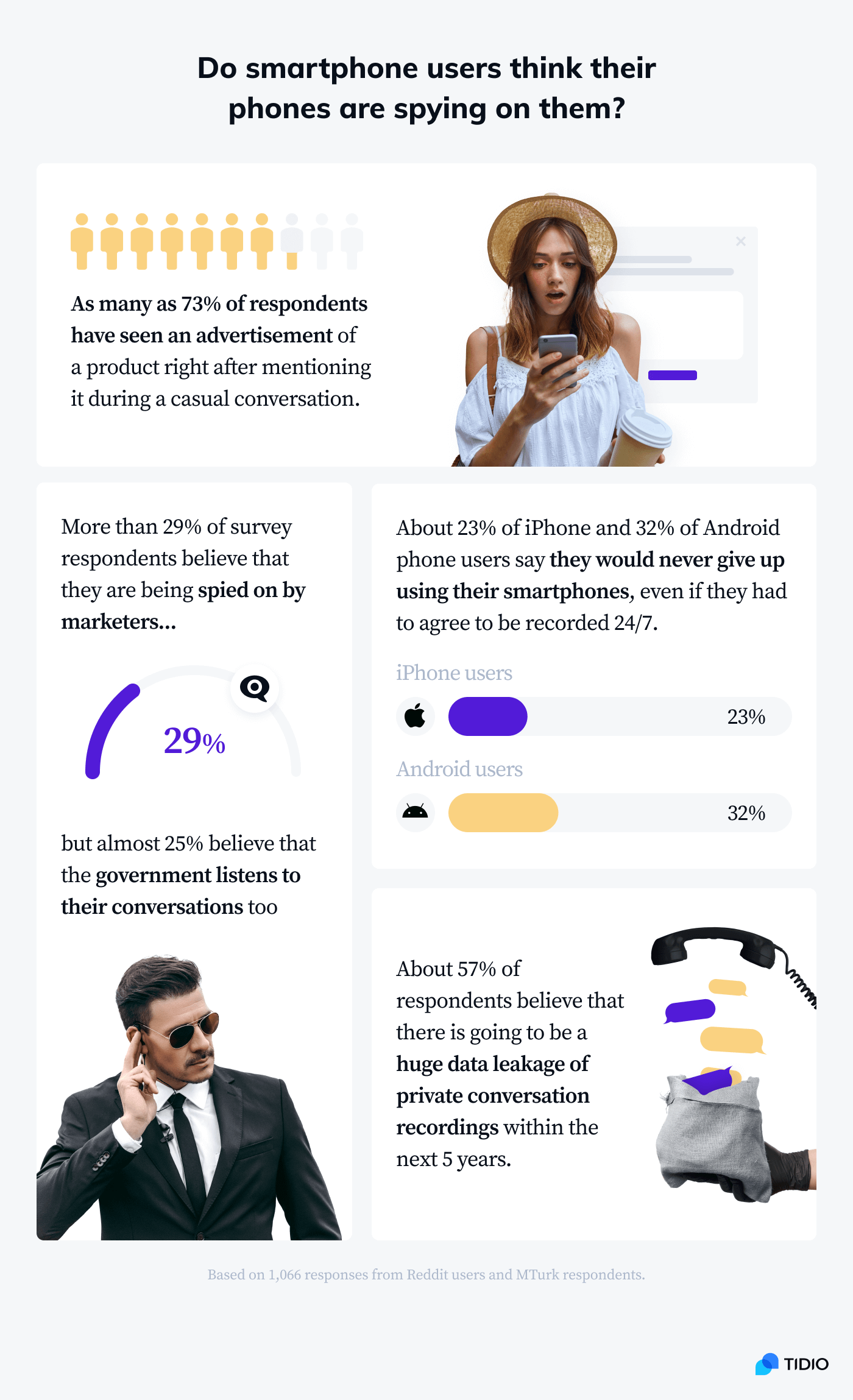
But let’s start with the answer to the most important question.
Do Our Phones Listen to Us?
According to our study, about 56% of people from the US suspect that their phones are listening to them.
Is this opinion justified? Is your brand new iPhone listening to you? Should we turn off Siri?
Yes and no. It mostly depends on our interpretation of the verb “listen.” It doesn’t work the way most people think.
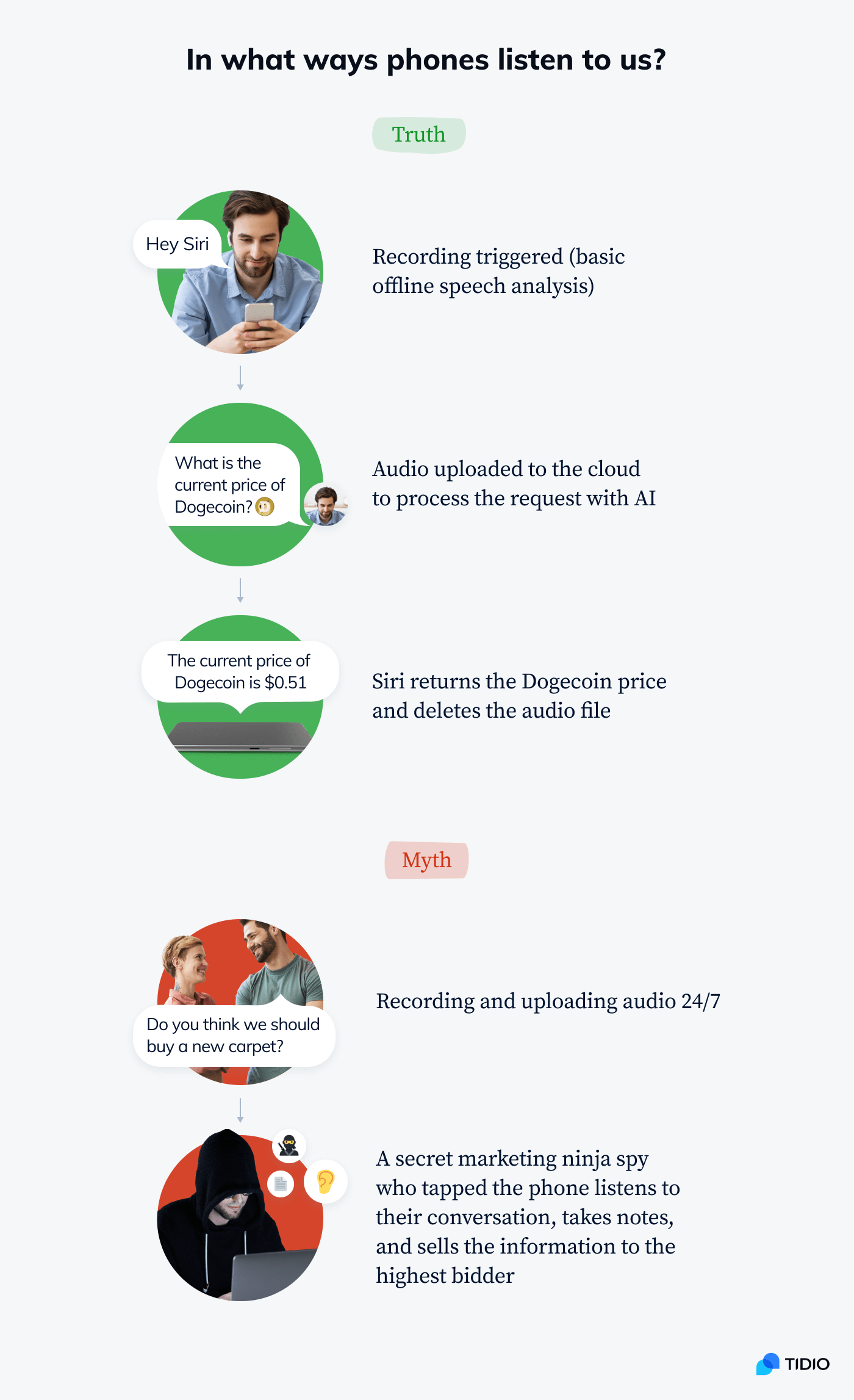
Some apps use microphones and offline speech recognition tools to trigger recording. For example, when we enable the voice assistant and say “Hey Siri” to our iOS phone, we initiate recording (the same happens with “OK Google” and Google Assistant).
The audio recordings are processed in the cloud afterwards. Unless you explicitly allow Siri to keep the audio for further analysis (which is anonymous), the files are deleted.
However, the commands that you give can still indirectly leave a trace and be tracked by other companies. If you tell Siri to search the web for a product, Google will still remember it and you will be targeted by marketers. It works just like a regular search.
While phones and selected apps do “listen” to you all the time, they don’t constantly collect your audio data or upload it to the servers. Additionally, you need to allow each and every app to access your microphone manually—this usually happens when you turn the app for the first time after installing it on your phone.
For the majority of our survey respondents, “listening” and “recording” seem to be the same thing. Only 16% of US respondents think that the process of recording needs to be triggered by a command or a keyword. The rest believes that our phones record us all the time, at random points in time, or once we open an app.
Virtual Assistants and AI Hiccups
Speech recognition algorithms don’t work without errors. They only listen for wake words but sometimes the recording process can be triggered accidentally. One of the most famous incidents involves a family in Portland who accidentally recorded and sent their private conversation to a person on their contact list. Their Alexa misheard a word and woke up and then mistook another one for the command to send. Stories like this one are isolated incidents.
The short answer?
Our phones don’t eavesdrop on our conversations. It’s a myth. Voice recognition technology cannot be interpreted as spying since the voice data is not gathered or stored by unauthorized parties.
Online Privacy and Confirmation Bias
Here is a breakdown of our survey respondents and their belief in being listened to.
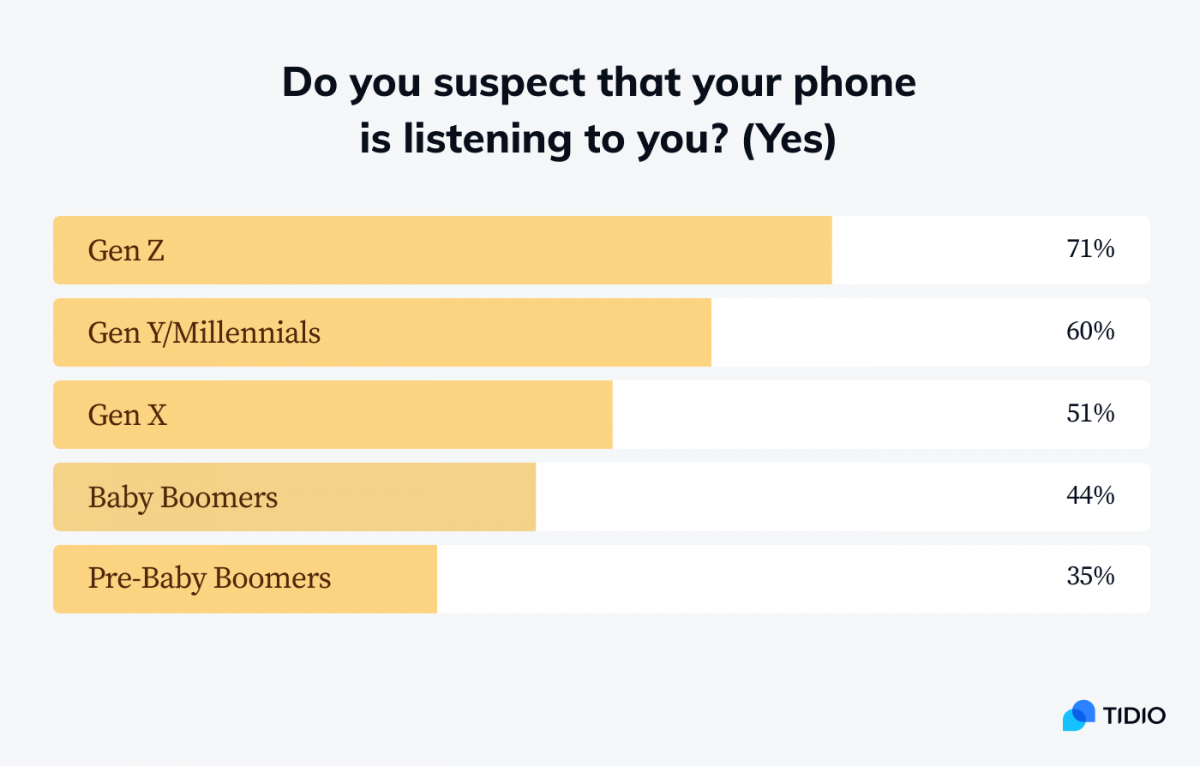
Interestingly, younger respondents seem to be convinced that they are being spied on more frequently than other generations.
Why do so many people believe that phones are spying on us and listen to everything we say?
It is a good example of a confirmation bias. People don’t trust big corporations or governments and they look for arguments that support their suspicions.
Targeted ads can be irritating and are often seen as an invasion of privacy. If someone doesn’t like the idea of using their search history or location tracking for marketing purposes, they may also be inclined to believe that it was obtained in a wrongful manner.
Confirmation bias occurs when people unconsciously interpret information in a way that corroborates their views.
When they see an advertisement for flights to Hawaii they immediately tend to think:
It happened because my phone was eavesdropping on my conversation with the neighbor. We were discussing our holiday plans in the morning and now they show me the ads. It is because THEY invade my privacy and record everything I say to use it against me.
And definitely not because you’ve been googling and comparing airline ticket prices for two weeks, right?
The majority of US respondents who experienced this phenomenon believe that the ads were probably the result of their browsing history (51%). Interestingly, respondents outside the US have chosen phone audio recordings as the primary reason (47%) for being targeted by the advertisers.
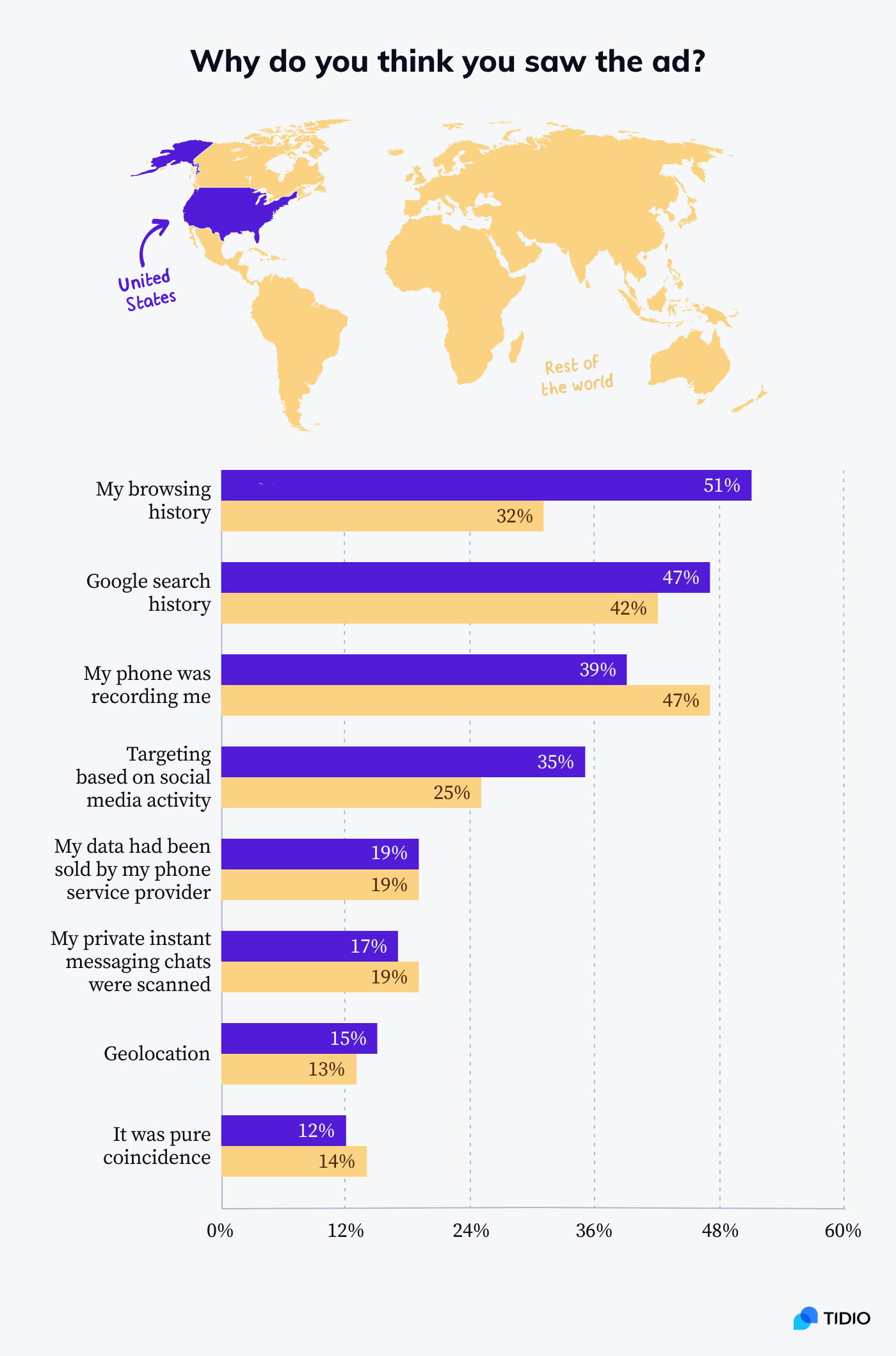
Who Spies on Consumers and Citizens
Most people agree that marketers know “everything” about us. However, the opinions vary from expressing reasonable concerns about privacy to spewing out wild conspiracy theories. Some of the respondents can be definitely located at the farther end of the spectrum.
Almost 47% of respondents think it is quite possible that there are real people monitoring our individual conversations. In point of fact, there are still those who believe that every US citizen has an agent assigned to them and that they are being monitored and recorded 24/7. This seems rather unlikely in the age of AI.
What is surveillance capitalism?
Surveillance capitalism is a form of capitalism that focuses on collecting and processing private data to generate more profits. Mass behavioral customer data is used for advertising, product development, and optimizing sales strategy. Companies like Facebook, Google, Amazon, or Apple own more information about society than all governments and intelligence agencies combined.
We asked our respondents who they think listens to their conversations. Advertisers and corporations were pointed out as the most likely to secretly listen to our private chats. They were chosen by 51% and 49% of respondents respectively.
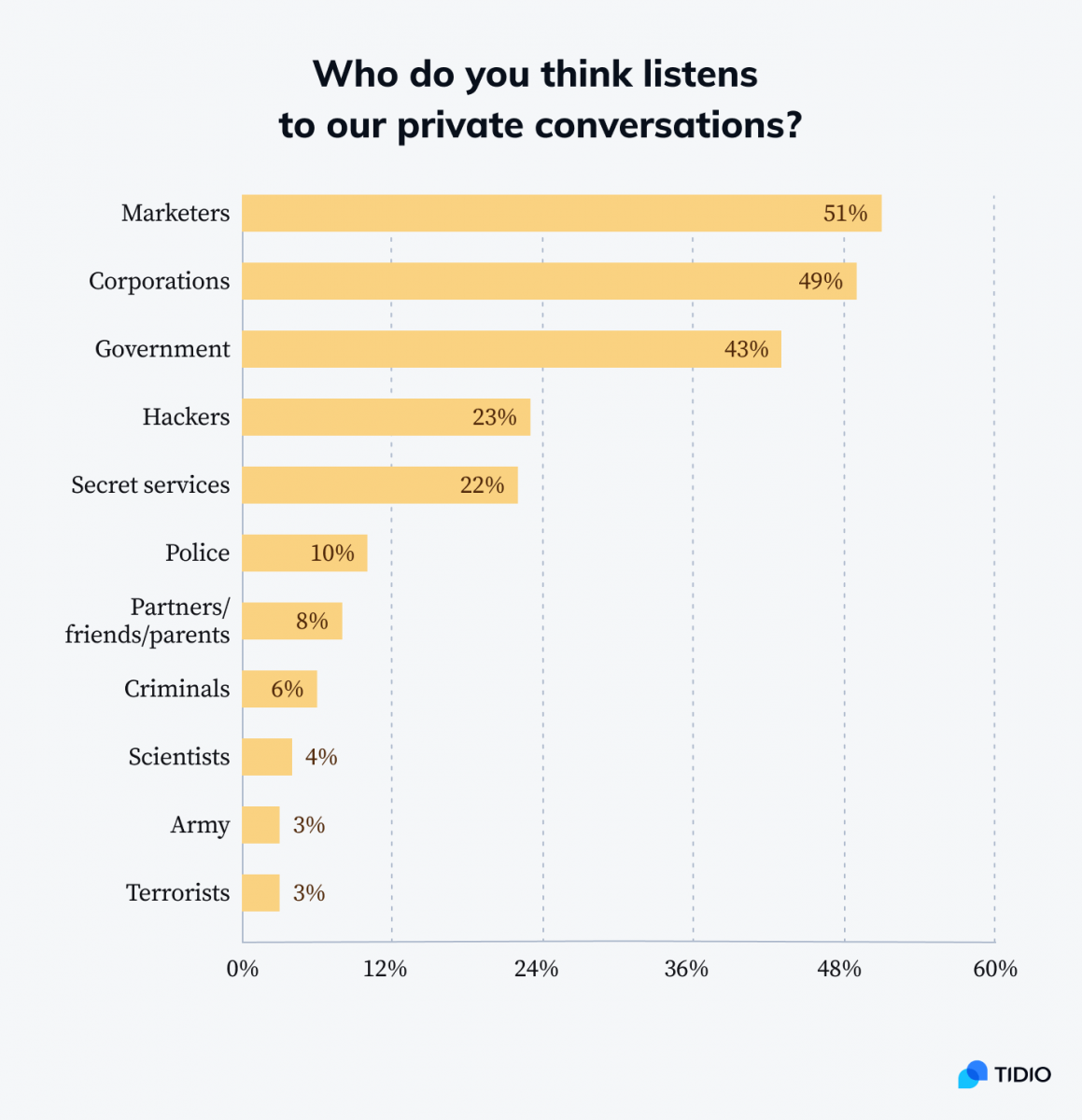
About two-thirds of respondents agree that the primary reason for companies listening to their conversations is digital marketing (63%) and behavioral analysis (54%).
Interestingly, our survey respondents believe that jealous partners or overprotective parents are almost as likely to spy on us as the police forces. About 8% of people suspect that their phones may have been tapped by their close ones.
While hackers, criminals, or terrorists were not the prime suspects, many respondents fear that audio recordings of their private conversation can be intercepted and cause serious trouble.
Almost 13% of all respondents were afraid of identity theft and almost 7% think someone can use it for blackmail. Furthermore, this was mostly a concern for male respondents—about 8% of them feared blackmail, compared to only 5% of women.
The respondents had very different opinions as to what kind of private data can and cannot be processed. Most of them believe that accessing private messages and audio recordings should be prohibited.
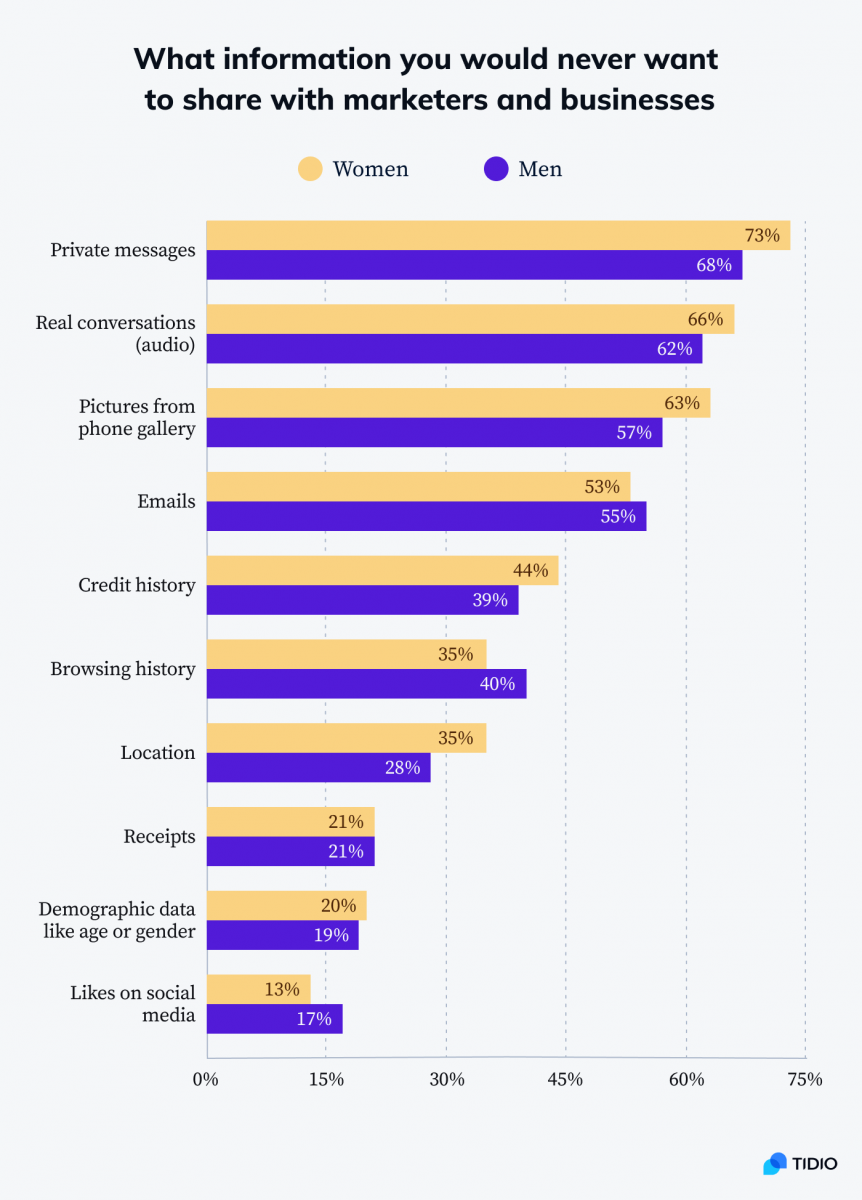
How to Check if Your Phone Is Listening to You and Stop It
About 91% of the survey respondents declared that maintaining online privacy is very important to them. Almost 61% are afraid that their private data may leak online. Still, 24% evaluate their knowledge of what kind of data is being tracked as poor. Furthermore, 22% of respondents don’t remember or don’t know if they agreed to be recorded by their phone.
Most of the respondents who suspect that their phones are listening to their conversations have never tried to check it empirically. Almost 51% percent of Android phone users tried to monitor their connection transfers or deliberately talk about a product. However, such tests were performed only by 34% of iPhone users.
If you want to have proof that your phone isn’t recording your conversations, try installing a network protocol analyzer such as Wireshark. One of the most interesting experiments was conducted by Gary Sims. He confirmed that everything was in order and his phone was not secretly recording him.
How to control which smartphone app can access the microphone:
If you want to see which apps can access your phone’s microphone, go to Settings > Permissions > App Permissions. You’ll see which apps can use your microphone and disable it at any time.
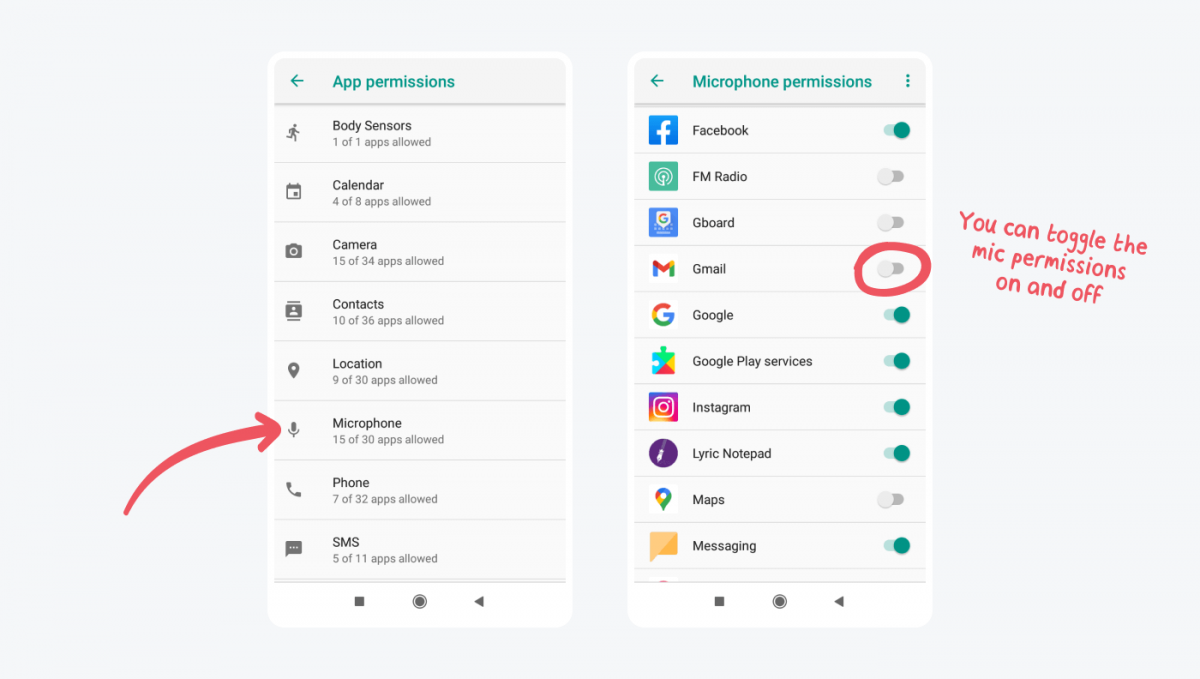
The best way to approach this problem is to pay attention to the permissions you grant when installing the app. If you don’t trust the app, you can disable certain app permissions. Additionally, when there is no justified reason for an app to get your microphone access, you can report that.
Is my phone spying on me in other ways?
If you are concerned about your personal data, you should double-check the privacy setting in Chrome and its memory usage, your Google account, and Facebook account. You can also read more about off-Facebook activity to learn more about different ways Facebook collects our information.
Conclusions: Can Your Phone Hear Your Conversations?
Phones don’t spy on our conversations, even if many people believe that it is the case. They do use voice triggers (if you allow them to) but without sending unauthorized audio.
Being concerned about your privacy does not make you paranoid. Many media outlets try to sensationalize the problem which leads to more misinformation. However, tests involving advanced network protocol analyzers have proven that there are no hidden data transfers between smartphones and popular app servers.
The matter of cybersecurity and privacy is taken very seriously by tech companies such as Google, Amazon, or Apple. Incidents linked with voice recognition software malfunction are widely commented on and addressed by the companies. There are many easier and more effective ways to learn about your (shopping) preferences, for example, your search history or tracking pixels. Your phone is not spying on you by recording your conversations because it doesn’t need to.
Sources:
Here is a selection of articles we referenced in the study:
- Amazon Admits Alexa Device Eavesdropped On Portland Family
- Gary Explains: Is Your Smartphone Spying on You?
- Your Phone Is NOT Secretly Spying on Your Conversations
- How to Test if Your Phone Is Spying on You
- You’re Not Paranoid. Your Phone Really Is Listening In
- Your Phone Is Listening and it’s Not Paranoia
- What Is off-Facebook Activity?
Methodology:
We collected valid answers (i.e. with a correct answer to the attention check question used in the survey) from 1,066 respondents. We used Amazon’s Mechanical Turk and Reddit.
Respondents were 48.6% males, 49.8% females, and 1.6% declaring as non-binary. The sample’s average age was 38 with a standard deviation of 13. Considering such age and gender makeup, the study’s findings can be extrapolated to the general US population.
Respondents had to answer approximately 30 questions. The majority of them were scale-based or multiple choice.
Digital privacy is a complex topic and many legal and technological aspects of it are misunderstood by the general public. We acknowledge that some of the answers might have been subject to such cognitive biases as recency, attribution, confirmation, or exaggeration.
Fair Use Statement:
Has our article helped you understand whether our smartphones are listening to us? Are you surprised by the results of the survey? Feel free to share statistics about popular attitudes towards this phenomenon. Just remember to mention the source and include a link to this page. Thank you!

